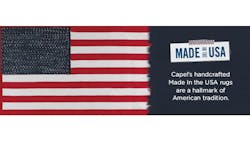Made in America – Capel Rugs' Stronghold in North Carolina
What began in 1917 is still in full force in 2015.
In 1917, A. Leon Capel saw an opportunity. He took the raw material from his Gee-Haw Plowline company braided it and turned it into a rug. The plowlines that were used to steer the mules had become obsolete but “every family could use a good braided rug.”
In 2015 his family still manufactures those braided rugs in North Carolina. In addition to the traditional rugs they offer rugs in many other styles and sell through dealerships, retail stores and private labels. In fact the tag line of the company is “America’s Rug Company."
“We are proud to be a family business,” said Richard Capel, director of Marketing. “There are four family members that run the company now. Our grandfather built upon his father’s business and here we are 97 years later, still going strong.”
Many textile companies have moved overseas. In fact from 1992-2012 the industry in North Carolina lost 86.7% of its employees.
Capel Rugs chose not to move. They did look into different locations, and they source globally, but they have kept the plants in the state. They have seven plants in Troy. “Having our manufacturing in the U.S. is a huge advantage for us,” says Richard. “We are a vertical company. From the raw product to the finished product, it's all under one roof. This allows us an advantage both over speed and the quality as we control the whole process.”
The North Carolina location has been successful due in part to the workforce. “There is a very strong workforce in this area, with skills necessary for our industry” explains Cameron Capel, vice president of Sales. “We see a good talent pipeline ahead as well. North Carolina State University has a large textile program, and in fact is one of the remaining programs in the state.” The College of Textiles at this universtiy ranks first in the world.
In addition to textile workers, Capel is able to find other manufacturing talent. "The regional area offers workers from a wide range of industries,” says Cameron, "so if they aren’t in our specific industry they still have skills we need.”
A workforce advantage that Capel Rugs has is what they call an extended family workforce . Many employees have parents and even grandparents who were employees at the company.
However, this industry, like others, has to look to the millennials as they are the future workforce. Devising ways to attract these workers to manufacturing is a common theme.
“There are fewer young people involved in textiles and they are more into design or the hi-tech side of the business rather than the traditional manufacturing side, so it’s creating a challenge,” says Cameron. “But we do provide a clear career track which is of interest to this generation of workers.”
Perhaps the company will capture these future workers through its use of technology.
During the Fall High Point Market held this past December the company worked with Google to capture panoramic images of the company's showroom. This effort resulted in 360-degree views of Capel's latest designer styles that, when viewed online through Google Street View technology, delivered an immersive, interactive tour of the showroom with intuitive navigation.
This technological innovation can expand the company’s reach. “This tool provides buyers with the ability to tour our showroom and view our products at their own convenience on any Web-enabled computer or mobile device, from any location and at any time," Cameron said.
The customer-driven technology advanced is mirrored by the shift in the industry in general. As the state is the center for the U.S. textile industry it has evolved over the years from traditional weaving and sewing textiles to advanced and technical non-woven textiles. There are approximately 4,400 employees in textile and apparel firms in the region. And the industry has a supply chain of 38 chemical plants with almost 2,500 employees producing raw materials for the textile industry.
Capel too is looking to innovation to keep the company strong and is exploring the use of different materials for its rugs. “Over the next three to five years we will expand the business in a variety of ways,” says Richard.
Expansion for this company however does not mean relocating plants. “America’s Rug Company” will stay put.
